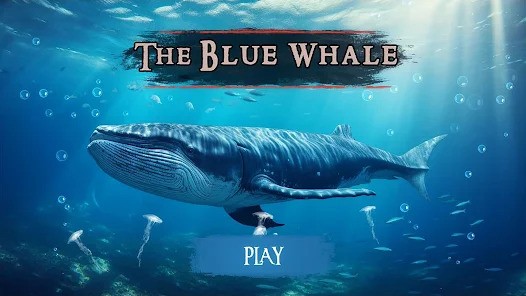The Blue Whale Game has captured global attention for all the wrong reasons. Often discussed in hushed tones and alarming headlines, this game is not just a fleeting internet trend; it’s a dangerous phenomenon endangering young lives. This blog dives deep into what the Blue Whale Game is, why it’s so hazardous, and what parents, educators, and young people need to know to stay safe.
Understanding the Blue Whale Game
The Blue Whale Game isn’t your typical online challenge. Originating from Russia, it preys on vulnerable teens by manipulating them through a series of increasingly harmful tasks. These tasks culminate in a final challenge that urges participants to take their own lives. Understanding the mechanics of this game is crucial in preventing its spread.
The game’s administrators exploit psychological tactics to gain control over participants. They often target those already struggling with mental health issues, making the situation even more dire. Teens are coerced into compliance through threats and emotional manipulation, creating a cycle that’s hard to break.
The Origin and Evolution
The Blue Whale Game first emerged in 2016 and quickly spread across social media platforms. Despite efforts to curb its reach, it continues to resurface, adapting to different cultures and languages. The anonymity of the internet allows perpetrators to evade law enforcement, making it a persistent issue.
The game has evolved over time, with new iterations appearing every few months. Each version tweaks the challenges slightly, but the core objective remains the same. This adaptability makes it a moving target, complicating efforts to shut it down permanently.
Psychological Manipulation Tactics
Administrators use a range of psychological tactics to control participants. They start with seemingly innocent tasks, gradually escalating to more dangerous activities. This slow build-up desensitizes participants, making them more likely to comply with extreme demands.
Isolation is another key tactic. Participants are encouraged to keep their involvement a secret, cutting them off from potential sources of help. This sense of isolation amplifies feelings of hopelessness, making the final challenge seem like a viable option.
Recognizing the Warning Signs
Parents and educators need to be vigilant for signs that a teen may be involved in the Blue Whale Game. These can include sudden changes in behavior, secrecy, and visible injuries. Early intervention is crucial in preventing tragedy.
Behavioral changes can manifest in various ways, from withdrawal from social activities to declining academic performance. Physical signs, such as unexplained cuts or bruises, should also raise red flags. Open communication can make a significant difference in identifying and addressing these warning signs.
The Role of Social Media
Social media platforms have become unwitting facilitators of the Blue Whale Game. The anonymity they offer makes it easier for administrators to recruit and manipulate participants. Monitoring and reporting mechanisms are essential in combating this issue.
Platforms like Facebook, Instagram, and TikTok have taken steps to address the problem, but loopholes remain. Enhanced moderation and stricter content policies are needed to make a lasting impact. Users should also be encouraged to report suspicious activities to help identify and remove harmful content.
Legal and Ethical Implications
The Blue Whale Game raises significant legal and ethical questions. Holding administrators accountable is challenging due to jurisdictional issues and the anonymous nature of the internet. However, legal frameworks are evolving to address these challenges.
Ethically, the responsibility extends beyond administrators to include social media platforms and internet service providers. They must balance user privacy with the need for safety, a complex issue requiring nuanced solutions. Legal experts are working on new regulations to hold these entities accountable.
Preventative Measures
Education is the first line of defense against the Blue Whale Game. Schools should incorporate digital literacy programs that teach students about online safety and the risks of such games. Parents should also engage in open dialogues with their children about internet use.
Community outreach programs can play a pivotal role in raising awareness. Workshops and seminars can equip both teens and adults with the tools they need to recognize and combat the Blue Whale Game. Collaborative efforts between schools, parents, and law enforcement are essential for a comprehensive approach.
Building a Support Network
A strong support network can make a world of difference for vulnerable teens. Encouraging open communication at home and in schools can help identify at-risk individuals early on. Peer support groups can also offer a sense of belonging and security.
Schools should have trained counselors available to provide support and guidance. Community organizations can offer additional resources, such as mental health hotlines and support groups. Creating a safe environment where teens feel comfortable seeking help is crucial.
The Role of Mental Health Professionals
Mental health professionals are on the front lines in the fight against the Blue Whale Game. Early intervention and ongoing support can help mitigate the risks associated with the game. Training for professionals to recognize and address these issues is essential.
Therapists and counselors should be equipped with the latest information and strategies to deal with the psychological manipulation tactics used by the game’s administrators. Collaboration between mental health professionals and law enforcement can also enhance the effectiveness of intervention efforts.
Global Efforts and Initiatives
Various organizations and governments are taking steps to combat the Blue Whale Game. International cooperation is key to effectively addressing this global issue. Sharing information and resources can help create a unified front against the game.
Initiatives like the Safer Internet Day and campaigns by organizations like UNICEF aim to raise awareness and promote online safety. These efforts highlight the importance of a collective approach, involving multiple stakeholders, to tackle the problem effectively.
The Power of Technology
Technology can be a double-edged sword in the fight against the Blue Whale Game. While it facilitates the game’s spread, it can also be harnessed for prevention and intervention. AI and machine learning can help identify and flag suspicious activities, aiding in early detection.
Developers are working on apps and software that can monitor online interactions for signs of involvement in dangerous games. These tools can send alerts to parents and authorities, enabling swift action. However, ethical considerations around privacy must be carefully managed.
Personal Stories and Impact
Sharing personal stories can be a powerful tool in raising awareness about the Blue Whale Game. Hearing from survivors and affected families can humanize the issue and underscore the real-world impact. These stories can also offer hope and encouragement to those currently struggling.
Media coverage often focuses on the sensational aspects of the game, but personal stories provide a deeper, more nuanced perspective. They highlight the emotional and psychological toll while also showcasing resilience and recovery. This dual focus can inspire action and support.
Conclusion
The Blue Whale Game is a sobering reminder of the darker side of the internet. However, with awareness, education, and collective action, we can mitigate its impact and protect vulnerable individuals. Staying informed and proactive is our best defense.



